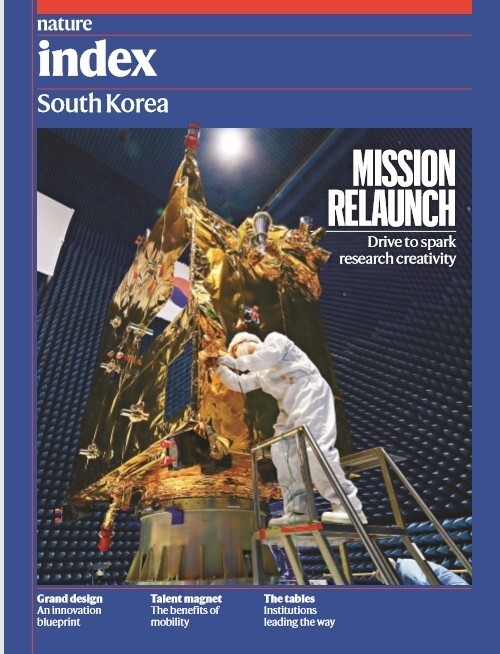hankyoreh
Links to other country sites 다른 나라 사이트 링크
Nature journal says government R&D role is key to S. Korea’s success in containing COVID-19

The journal Nature named the leading role of the government in research and development as one of the factors behind South Korea’s success with preventing the spread of the novel coronavirus, including its swift development and production of diagnostic kits during the virus response process.
On May 28, Nature published a special 14-page issue of Nature Index devoted to South Korea, in which it drew links between the recent coronavirus situation and what it described as the success of South Korea’s focused investment in basic research and top-down, government-led approach to R&D policy.
David Swinbanks, founder of Nature Index, said, “South Korea's 'top-down' planning forged the strong ties between government, academia and industry that helped it become a global leader in information and communication technologies and in innovation generally.”
“The top-down approach played a key role for example in the nation's ability to quickly develop and produce diagnostic kits for COVID-19,” he added.
According to Nature Index, South Korea ranked between eighth and ninth for the years 2015 to 2019 in high-quality research production in the key “sharing” indicator. Amid China’s rapid rise, the country surpassed Japan in 2018 to become South Korea’s second-ranked partner in R&D. The US remains in first place. In terms of R&D spending as a percentage of gross domestic product (GDP), South Korea’s ratio of 4.5% in 2018 ranked second only to Israel (4.9%).
Describing the South Korean government’s systematic approach as a key factor in the creation of an innovation economy that transforms laboratory ideas into products, Nature praised the intensification of Institute for Basic Science (IBS) reviews and the diversification of the research environment through proactive efforts to recruit overseas researchers.
Developed by Nature publisher Springer, Nature Index is an internationally renowned index of science and research. Its ratings are based on research findings published in the top 1% of scientific journals (82 in total), including Science and Cell.
By Koo Bon-kwon, senior staff writer
Please direct comments or questions to [english@hani.co.kr]

Editorial・opinion
![[Column] When ‘fairness’ means hate and violence [Column] When ‘fairness’ means hate and violence](https://flexible.img.hani.co.kr/flexible/normal/500/300/imgdb/original/2024/0516/7417158465908824.jpg) [Column] When ‘fairness’ means hate and violence
[Column] When ‘fairness’ means hate and violence![[Editorial] Yoon must stop abusing authority to shield himself from investigation [Editorial] Yoon must stop abusing authority to shield himself from investigation](https://flexible.img.hani.co.kr/flexible/normal/500/300/imgdb/original/2024/0516/4417158464854198.jpg) [Editorial] Yoon must stop abusing authority to shield himself from investigation
[Editorial] Yoon must stop abusing authority to shield himself from investigation- [Column] US troop withdrawal from Korea could be the Acheson Line all over
- [Column] How to win back readers who’ve turned to YouTube for news
- [Column] Welcome to the president’s pity party
- [Editorial] Korea must respond firmly to Japan’s attempt to usurp Line
- [Editorial] Transfers of prosecutors investigating Korea’s first lady send chilling message
- [Column] Will Seoul’s ties with Moscow really recover on their own?
- [Column] Samsung’s ‘lost decade’ and Lee Jae-yong’s mismatched chopsticks
- [Correspondent’s column] The real reason the US is worried about Chinese ‘overcapacity’
Most viewed articles
- 1China calls US tariffs ‘madness,’ warns of full-on trade conflict
- 2[Column] US troop withdrawal from Korea could be the Acheson Line all over
- 3[Editorial] Yoon must stop abusing authority to shield himself from investigation
- 4[Column] When ‘fairness’ means hate and violence
- 5[Column] How to win back readers who’ve turned to YouTube for news
- 6US has always pulled troops from Korea unilaterally — is Yoon prepared for it to happen again?
- 7[Book review] Who said Asians can’t make some good trouble?
- 8Naver’s union calls for action from government over possible Japanese buyout of Line
- 9Could Korea’s Naver lose control of Line to Japan?
- 10[Editorial] Korea must respond firmly to Japan’s attempt to usurp Line